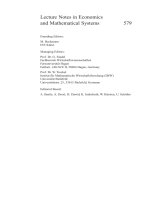Lecture Issues in economics today - Chapter 37
Bạn đang xem bản rút gọn của tài liệu. Xem và tải ngay bản đầy đủ của tài liệu tại đây (337.47 KB, 15 trang )
Chapter 37
Taxing the Returns on Capital
McGrawHill/Irwin
© 2002 The McGrawHill Companies, Inc., All Rights Reserved.
Chapter Outline
• CAPITAL INCOME AND EARNED
INCOME: WHO MAKES IT?
• HOW CAPITAL INCOME SHOULD BE
TAXED
• THE CURRENT SYSTEM
• THE EFFECT OF CAPITAL TAXATION
ON GROWTH
McGrawHill/Irwin
© 2002 The McGrawHill Companies, Inc., All Rights Reserved.
General Issues Taxation
• Which should be the most important
economic issue of taxation?
– the fairness of the tax, or
– the impact of the tax on economic growth.
– that impact of the tax on economic
incentives.
• Many economists consider the latter
issue to be very important.
McGrawHill/Irwin
© 2002 The McGrawHill Companies, Inc., All Rights Reserved.
Who Earns Capital Income
• Capital Income
– Income earned through investments.
• Types of Capital Income
– Interest
– Dividends
– Capital Gains
• income generated by selling an asset for more than was
paid for it
• The wealthy and high-income earners get a
higher percentage of the income from
investments than do the poor and low income
earners.
McGrawHill/Irwin
© 2002 The McGrawHill Companies, Inc., All Rights Reserved.
P e rc e n ta g e o f In c o m e
Source of Incom
Earned vs Capital
100
80
60
Salary
40
Capita
20
0
McGrawHill/Irwin
1 10000
20000
30000
50000
100000
500000
Income Level
© 2002 The McGrawHill Companies, Inc., All Rights Reserved.
Lorenz Curve
• A Lorenz curve which measures the
inequality of income.
– A graph that maps the cumulative
percentage of population against the
cumulative percentage of another variable,
like income
• A straight line indicates perfect equality.
• The greater the bow, the greater the
inequality.
McGrawHill/Irwin
© 2002 The McGrawHill Companies, Inc., All Rights Reserved.
C u m m u la t iv e P e r c e n
Lorenz Curves
Earned Income and Capita
100
80
60
Earned Inc
40
Capital Inc
20
0
0
20
40
60
80
100
Cummulative Percentage of Retur
Earned income is generated in a more equal way
than unearned income
McGrawHill/Irwin
© 2002 The McGrawHill Companies, Inc., All Rights Reserved.
A Gini Coefficient
• A measure of economic equality
ranging from zero to one.
• It is the ratio of the area under the bow
of the curve to the total area possible
under a line of perfect equality.
• For earned income it is .49.
• For capital income it is .26.
McGrawHill/Irwin
© 2002 The McGrawHill Companies, Inc., All Rights Reserved.
How Capital Income Should
Be Taxed
• Capital income should be taxed in such a way
that it does not alter the incentive to
–
–
–
–
–
–
McGrawHill/Irwin
Save or invest
Invest in short term assets
Invest in long term assets
Invest in risky assets
Invest in safe assets
Work
© 2002 The McGrawHill Companies, Inc., All Rights Reserved.
An Untaxed Market for Capital
Interest A
rate (r)
Supply
C
r*
B
Demand
I*
McGrawHill/Irwin
•Consumer Surplus
•r*AC
•Producer Surplus
•Br*C
Investable
Funds
© 2002 The McGrawHill Companies, Inc., All Rights Reserved.
Capital Markets When Only
Capital Income Is Taxed
Interest A
rate (r)
r’
Supplyafter tax
E
C
r*
r”
Such a tax discourages
investment so the
deadweight loss is
GEC
G
B
McGrawHill/Irwin
Supplybefore tax
Demand
I’
I*
Investable
Funds
© 2002 The McGrawHill Companies, Inc., All Rights Reserved.
Capital Markets When Only
Earned Income Is Taxed
Interest A
rate (r)
Supplybefore tax
Supplyafter tax
C
E
r*
r’
G
B
McGrawHill/Irwin
Such a tax over-encourages
investment so the
deadweight loss is
GEC
Demand
I* I’
Investable
Funds
© 2002 The McGrawHill Companies, Inc., All Rights Reserved.
The Current System
• People owe a tax on all gains whether or not they are
real.
– This means that we tax as income those returns from
investment that merely compensate investors for inflation.
– This inefficiently discourages savings.
• Capital gains are taxed on realization rather than
accrual.
– This means that a tax can be delayed.
– This inefficiently encourages people to hold assets they
would ordinarily sell.
• Capital gains are forgiven at death.
– This means that a tax can be avoided altogether.
– This inefficiently encourages the elderly to hold assets they
would ordinarily sell.
• The Capital gain on a home is exempt
– This encourages inefficiently high levels of consumption/
investment in homes.
McGrawHill/Irwin
© 2002 The McGrawHill Companies, Inc., All Rights Reserved.
The Net Result
• Though capital gains income is taxed at
a lower rate the overall result is that
capital generated income is taxed at a
level that is somewhat higher than the
efficient level.
• Correcting this would require that some
other tax be raised which is politically
problematic.
McGrawHill/Irwin
© 2002 The McGrawHill Companies, Inc., All Rights Reserved.
The Effect of Capital Taxation
on the Economy as a Whole
• If the supply curve of capital is upward
sloping (and not vertical) and if the tax
rate on capital is higher than is efficient,
growth is inhibited.
• Aggregate demand is less than it would
otherwise be because of reduced
savings and investment.
McGrawHill/Irwin
© 2002 The McGrawHill Companies, Inc., All Rights Reserved.









